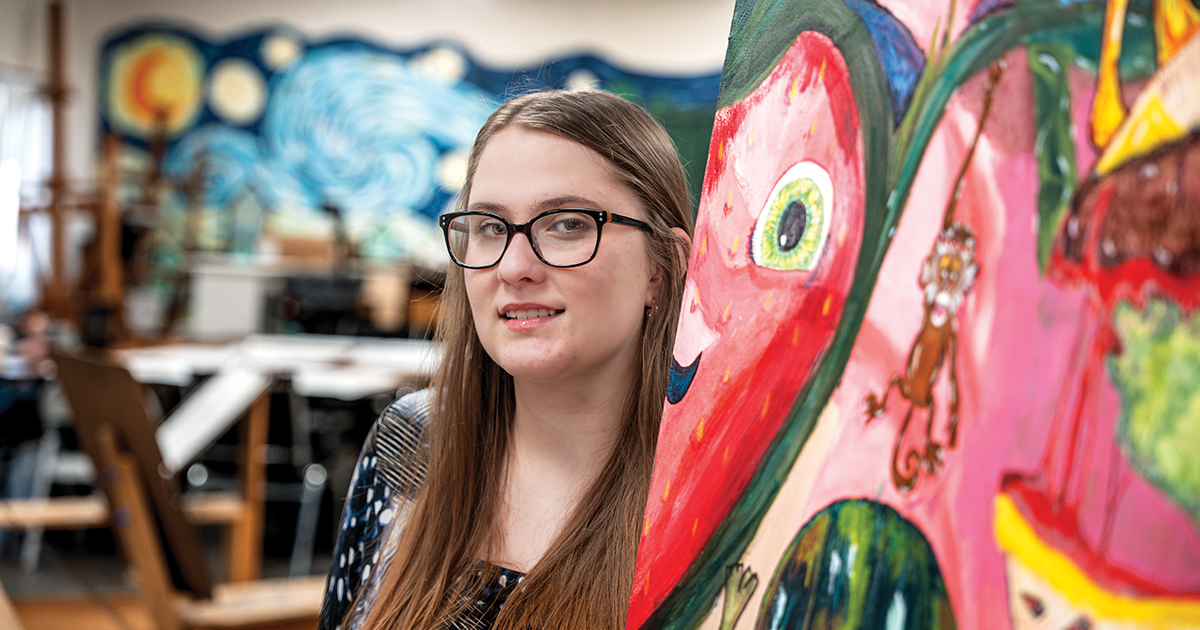
4 minute read
HEALING BEYOND THE BODY Researching the Intersection of Medicine, Art and Awe
The University of Pikeville’s Medical Humanities program continues to expand its impact, encouraging interdisciplinary research that bridges the gap between healthcare and the human side of medicine. By blending the sciences with the humanities, the program equips students with the tools to view medicine not just as a clinical practice but as an art that considers the social, cultural and ethical dimensions of health.
This spring, the College of Arts and Sciences proudly awarded two students the Medical Humanities Spring 2025 Research Award, recognizing their innovative contributions to the field. Their projects reflect the program’s commitment to expanding the boundaries of healthcare by exploring emotional and creative healing.
Ashley Elkins, a senior in biomedical sciences with a global health minor, is investigating how awe-inspiring experiences such as stargazing or immersing oneself in nature can positively impact both emotional and physical health. Her project, Health through Awe: Out of This World Support for Healing, explores the therapeutic power of awe and its potential to reduce stress, foster connectedness and improve overall well-being.
“We hope our research sheds light on the connection between emotion and the body,” said Elkins.
“Understanding how emotions affect us physically could change how we approach treatment and healing.”
Elkins is collaborating with the East Kentucky Science Center, Varia Planetarium and UPIKE’s Chamber Singers to offer a multi-sensory experience for participants, combining astrological and musical elements to elicit awe. Her work is part of a growing body of research suggesting that awe, whether from nature, art or music, can be a powerful therapeutic tool.
“This project has shown me that healthcare and the humanities can work hand-in-hand,” said Elkins.
“When a physician treats a patient, they consider their medical history. Adding humanities can provide a deeper understanding of the patient’s identity, resulting in more holistic care.”
Maddi Roberts, a senior majoring in elementary education with an art minor, is focusing her research on the therapeutic effects of visual art on self-esteem in marginalized individuals. In her project, Increasing SelfEsteem through Visual Art Expressions and its Public Display, Roberts used oil pastels as an accessible medium to encourage self-expression. She worked with diverse community groups and measured changes in self-esteem before and after the art-making process using an adapted version of the Rosenberg Self-Esteem Scale. One of the most profound aspects of her work was observing how individuals, many of whom initially doubted their artistic abilities, gained confidence through creating and publicly displaying their work.
“As an education major, it’s easy to get caught up in standardized tests and curriculum demands, but my art minor has shown me the deeper impact of creative expression,” said Roberts. “Art has given me confidence and serves as a form of self-care. This project allows me to explore how guided and self-directed visual art can enhance self-esteem in different groups of people.”
Her findings reinforce the growing understanding that art has a place in education and healthcare settings, where creative expression can serve as an outlet for emotional healing and self-empowerment. Roberts hopes her research will inspire further interdisciplinary collaboration, including partnerships with biomedical students and healthcare professionals to explore the therapeutic potential of art in clinical settings.
“I heard people say ‘I am not an artist’ dozens of times a day. By the end of the sessions, those same individuals proudly showcased their work, realizing their creative potential. Watching their faces light up during the art exhibition was an unforgettable experience,” said Roberts. “This project has helped me learn skills that I can use in my future classroom, and I hope this research educates the public on the significance of medical humanities.”
Both research projects underscore the importance of medical humanities in shaping new perspectives on healthcare. By integrating humanities with medical studies, the program empowers students to view patients as individuals with unique stories and experiences, not just medical cases.
“The Medical Humanities program isn’t just about studying healthcare. It’s about understanding people and their stories,” said Assistant Dean of Health and Wellness and University Chaplain Robert Musick, D.Min. “These student-led projects challenge the traditional boundaries of healthcare, offering new ways to improve both mental and physical health through a deeper understanding of the human experience.”










